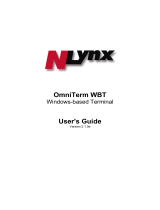
Table of contents
1 Introduction ...................................................................................................................... 1
Image Updates ........................................................................................................................ 2
2 The Desktop ..................................................................................................................... 3
Display ................................................................................................................................... 4
Taskbar .................................................................................................................................. 4
Start Menu .............................................................................................................................. 5
Icons ...................................................................................................................................... 5
3 HP ThinConnect ................................................................................................................. 6
Advanced Window .................................................................................................................. 7
Creating User Accounts ............................................................................................................ 8
Connections .......................................................................................................................... 12
Adding Connections ................................................................................................ 13
Editing Connections ................................................................................................. 13
Deleting Connections ............................................................................................... 14
Assigning Connections to Users ................................................................................ 14
Assign Connections Tab ............................................................................ 14
Assigning Connections .............................................................................. 16
Designating Connections as Primary or Secondary ....................................... 16
Enabling Automatic Connection and Reconnection ....................................... 17
Configuring the User Interface ................................................................................................. 18
Auto Starting HP ThinConnect ................................................................................... 18
Setting the Terminal to Kiosk Mode ............................................................................ 19
Enabling Automatic Log On and Keyboard Functions ................................................................. 20
Switching to a Different User ................................................................................................... 22
4 Control Panel .................................................................................................................. 23
802.1x Wired Client .............................................................................................................. 24
Accessibility .................................................................................................................. 27
v






















